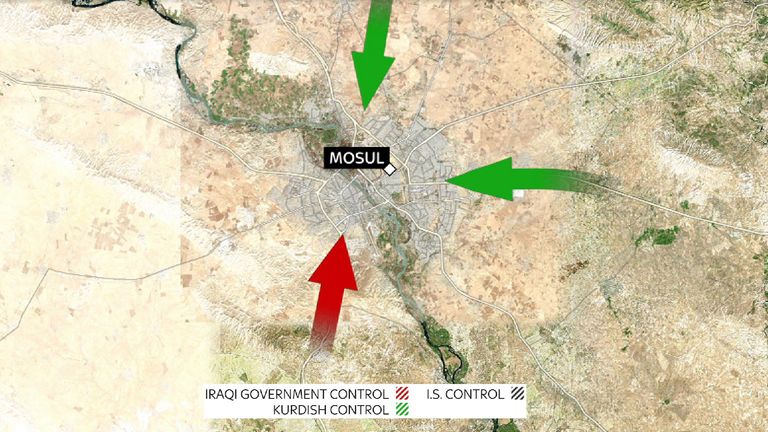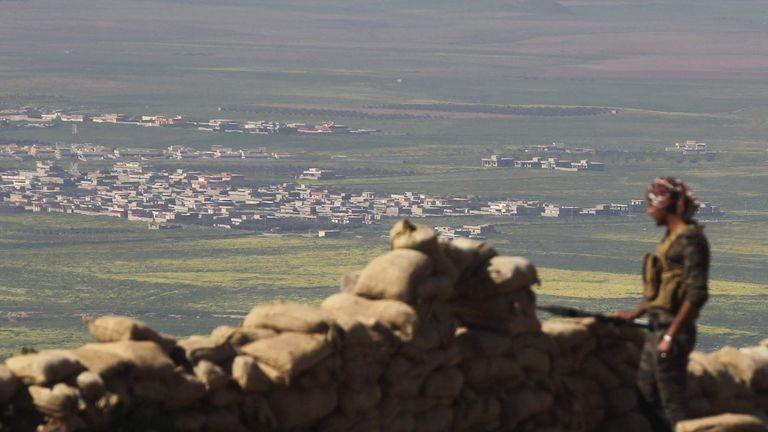Mosul: Battle to retake Islamic State stronghold 'going very well'
Up to 40,000 ground troops are being backed by US-led coalition airstrikes, with snipers sent in first to fight street-by-street.
Monday 17 October 2016 18:14, UK
The battle to retake control of the Iraqi city of Mosul from Islamic State "is going very well", a military commander spearheading the offensive has said.
Convoys of Iraqi and Kurdish forces were pushing towards the east of the city on Monday, as US-led coalition airstrikes sent plumes of smoke into the air amid the sound of heavy artillery rounds.
Army Lt. Gen. Talib Shaghati said troops were pressing forward according to plan.
Some 2,000 Iraqi special forces are being supported by four brigades of the regular Iraqi Army, 15,000 Sunni militia, 15,000 Kurdish Peshmerga and a few thousand Shia militia.
They are taking the fight to an estimated 3,000 IS fighters in the city, with snipers sent in first to fight street-by-street.
Sky's Defence Correspondent Alistair Bunkall said: "The fear is that Mosul will be rigged with explosives.
"The other fear is chemical weapons. There is no doubt Islamic State has the capability and it's possible the group has been saving the weapons for 'D-Day'."
The Iraqi army dropped thousands of leaflets over the besieged city warning more than a million civilians of the imminent military offensive.
Lieutenant General Stephen Townsend, commander of the US-led coalition, said the assault could last weeks - "possibly longer".
"This may prove to be a long and tough battle, but the Iraqis have prepared for it and we will stand by them," he said.
Most of the coalition's support has come in the shape of airstrikes and training, but US, French and British special forces are now also on the ground to advise local forces.
The push to retake the city is the biggest military operation in Iraq since American troops left in 2011.
Mosul was overrun by heavily armed Islamic State militants in 2014 in what was described as a "total collapse" of government security forces, causing thousands of families to flee to Iraq's autonomous Kurdish region in the north.
IS leader Abu Bakr al Baghdadi visited the city to declare an Islamic caliphate which at one point covered nearly a third of Iraq and Syria.
Using Mosul as a base, the jihadi group swept further south through Iraq's towns and cities, but government soldiers trained by US forces have since gained ground and Mosul is now the last city in the country held by IS.
As the assault got under way, Turkey's President Recep Tayyip Erdogan also signalled his country's involvement, saying: "Our brothers are there and our relatives are there."
According to UN estimates, up to one million people could be displaced from Mosul during the operation, exacerbating the humanitarian situation in the country.
It said families were at "extreme risk" of being caught in crossfire, tens of thousands may end up besieged or held as human shields and thousands could be forcibly expelled.
Families have been advised by local forces to stay inside and erect a white flag on their homes to stay safe.
Fawaz Gerges, Professor of International Relations at the London School of Economics, said there was no doubt the battle would deliver "a shattering blow" to IS, "bleeding" from the loss of some of its other cities - Fallujah and Ramadi.
"The question for me, and I could be wrong, is not whether Mosul will fall... but how long will it take? And what are the consequences? Does the government have a reconstruction plan?
"The centre of Mosul is 10 miles wide and 10 miles long. Yes, it is going to be a long fight, a costly fight, but the end result is very clear.
"I am more concerned about the morning after. How to bridge the ethnic divides."

























